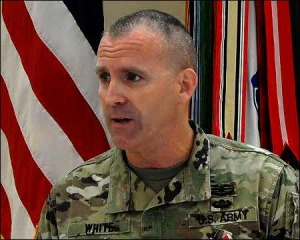nsnbc : U.S. Maj. Gen. Robert P. White, the top U.S. ground commander leading the anti-Islamic State coalition in Iraq on Thursday said he has not seen any evidence that suggests that Iraqi security forces or militia plan to attack Kurdish Peshmerga forces in Kirkuk or any area in Iraq’s Kurdistan Autonomous Region.
The Kurdistan Regional Government (KRG), on Wednesday, reiterated that Iraqi forces, especially the Iranian-backed Shiite Popular Self-Defense Forces or Hash al-Shaabi may be preparing attacks against Kurdish Peshmerga forces in Kirkuk and other areas within Iraq’s Kurdistan Autonomous Region (KAR) or in disputed areas like Kirkuk. Speaking to reporters at the Pentagon Maj. Gen. Robert White said:
“I’ve actually got absolutely zero proof that anybody at the senior level of the Iraqi Security Force apparatus has sent any threatening messages to the government in Erbil, or their partners in this fight against [the Islamic State].”
Iraqi security forces, alongside Kurdish Peshmerga and Iranian-backed Shia militias known as Popular Mobilization Forces (PMF) or Hashd al-Shaabi have been clearing out pockets of Islamic State resistance in and around the northern Iraqi city of Hawija. The city, which lies roughly 40 miles west of the oil-rich city of Kirkuk, was liberated by Iraqi and coalition forces in late September 2017.
The vast Iraqi military presence around Hawija was simply “a natural conclusion” to the siege and eventual recapture of the city from [Islamic State] control, the two-star general said. “The plan all along has been to mass Iraqi Security Forces as close as possible to the [city] … to close the distance and deny Daesh (ISIS / ISIL) freedom of maneuver.”
Concerns about a possible military confrontation were prompted by several factors. One of them was that Iraq’s federal government deployed some additional troops to Kirkuk while stressing the KAR’s independence referendum was illegal. Concerns were also caused because leading Iraqi Shiite politicians, leading Iranian politicians and leading Turkish politicians had implied, and in some cases directly stated that the referendum, Kurdish independence, or Kurdish annexation of Kirkuk would lead to war.
The United States as well as most EU member states opposed the referendum stressing that the timing was bad and that the referendum could weaken the alliance against the Islamic State. Two days after the referendum vote on September 25, Iraqi parliamentarians voted to deploy the country’s security forces to Kirkuk and reclaim control of the city from Kurdish control. Iraqi Prime Minster Haider al-Abadi also shut down all commercial air traffic into and out of Iraqi Kurdistan, after officials from the Kurdistan Regional Government, or KRG, refused to cede control of the territory’s airports to Baghdad.
The oil rich Kirkuk city and province in Iraq’s north is claimed by both Iraq’s central government and the country’s Kurdish region. KAR President Masoud Barzani insisted that Kirkuk participate in the referendum but promised that the Kurdistan region would accept the will of the people in Kirkuk regardless whether they voted for or against Kurdish independence.
Kirkuk has previously been a predominantly Kurdish city and region that has always had Arab, Christian, Yezidi and Turkmen communities as well. It was during the Iraq – Iran war that the Baath Party government of Saddam Hussein significantly changed the demographics of Kirkuk by prompting Arabs to move to the region and the city. It is worth noting that Iran – at that time – strongly supported Iraq’s Kurds as proxies against the Iraqi military. After the war, it were not only Iraq’s Kurds but also Kurds in Iran who felt betrayed by Tehran. It would be a logical fallacy to assume that the fact that General White “hasn’t seen any evidence” yet does not preclude that Iranian proxies or Shia elements in Baghdad won’t provoke an armed conflict.
CH/L – nsnbc 13.10.2017
Source Article from https://nsnbc.me/2017/10/13/86643/
 RSS Feed
RSS Feed















 October 13th, 2017
October 13th, 2017  Awake Goy
Awake Goy 











 Posted in
Posted in  Tags:
Tags: 













